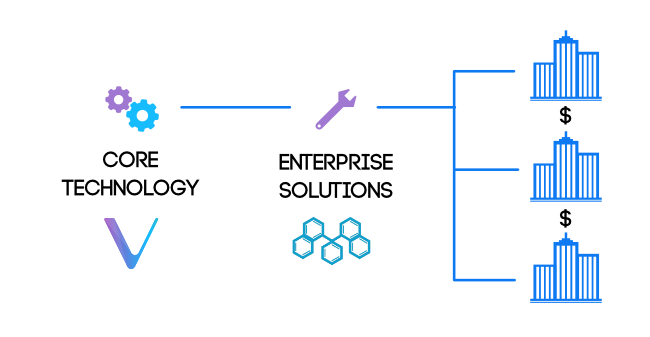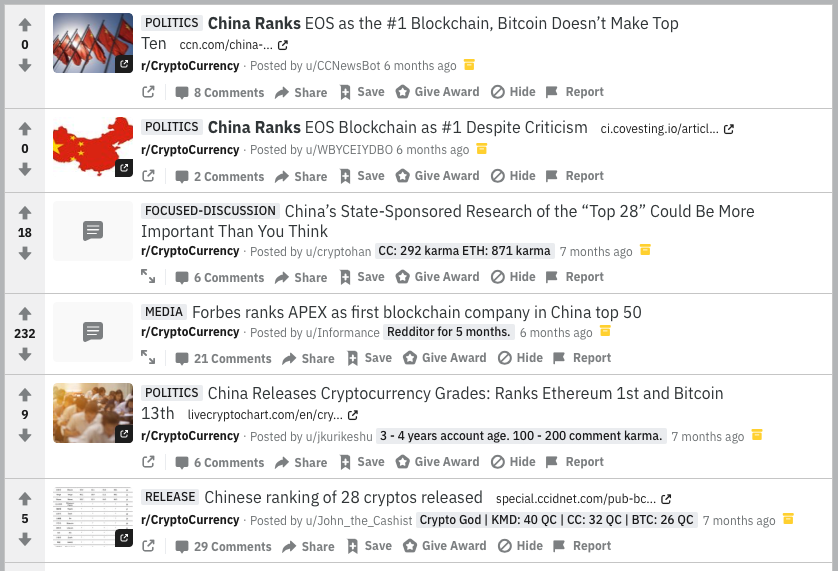2018 was a challenging year for the community, and many investors struggled to maintain faith as they watched market prices collapse across the board. For projects working in China, it was exponentially harder, as government regulations forced many of them into hiding or exile abroad. At the beginning of the year, they announced a ban on exchanges, as well as projects raising funds through ICOs. In the summer, they made things even more difficult by shuttering social media accounts that were discussing digital currencies, while banning events within the country. The message from Beijing was pretty clear: digital currencies would be outlawed until the central government was able to figure out what to do about them.
It’s a Catch-22 for Beijing, as blockchain, IoT, and AI are areas that the country is desperate to advance in, especially as it applies to food safety, biotech, environmental protection, product verification, and vaccination control. Digital currencies work hand-in-hand with many of these technologies, but they also allow for digital payments and capital flight, two areas Beijing is determined to control. Ultimately, Beijing would love to be the country at the forefront of the tech-world, especially if it means trumping key trade rivals such as the United States.
It’s a geographically large and diverse country with more than a billion people, who speak a language that is extremely difficult for outsiders to learn. That fact is compounded by an opaque political system steeped in a culture of secrecy; a fast-changing economy that operates in ways radically different from our own; unreliable official data and statistics; and a unique and complex set of incentives that influence the economic decisions of individuals, companies, and the myriad branches of the state.
Dinny McMahon, China’s Great Wall of Debt
Protecting their own
To see how much this technological rivalry means to the central party, we needn’t look much further than the recent arrest of Huawei CFO Meng Wanzhou in Vancouver. After news spread across the globe, Beijing launched a full-scale media assault, claiming there was zero evidence of any wrongdoings, and claiming the US and Canada were violating her human rights. Shortly after, China detained three Canadian citizens, in what can only be viewed as a tit for tat retaliation.
On the ground in China, the effect of the arrest has been highly impactful, with many citizens regarding Canada as a spineless tool of the US government, as they rallied behind Meng Wanzhou and Huawei on social media. It has been a bit of a lightning rod for national pride, which is something Beijing is keen to foster as they grapple with slowing growth and economic reforms. Tech companies are a critical element of modern-day soft power, and expected to be a vital part of China’s quest to become both a regional and global leader.
SOEs and Reform
The list of areas within China needing reform is lengthy and tedious. State owned enterprises (SOEs) continue to account for up to 40% of its stock market, yet productivity of SOEs is reported to be around 30-40% of their privatized counterparts. Most of these SOEs are just large, inefficient entities that borrow money from state-owned banks to pay for unprofitable projects, which they can claim as “growth”. This isn’t the type of growth sustainable governments can rely on, prompting the government to encourage growth by consumption, in which people are actually spending money, and companies are fiscally responsible.
For Beijing to make good on their plans for increased consumption, they need to find ways to dramatically reform SOEs, allowing them to operate more freely, while increasing transparency. Long-term, this could have strong effects on blockchain and tech development, as companies willing to adopt less-traditional business models will benefit from an open marketplace, and SOEs will have more freedom to integrate with the private sector. Many SOEs will be forced to adapt, and find ways to provide services and goods that people want, rather than just pleasing government leaders and relying on a string of loans to balance the books.
Whether or not a solution is available, many companies in China, especially SOEs, will be reluctant to begin publicly embracing blockchain while they wait for Beijing to provide clarity on the legality of the technology. That’s not to say companies aren’t working on integration, however. BYD’s bold announcement back in September showed both China and the world they were serious about integrating AI, blockchain, and other new technologies into an open-platform smart vehicle system.
 The significance of VeChain integrating with China’s top companies should not be understated
The significance of VeChain integrating with China’s top companies should not be understated
Patience is key when waiting for China to adapt their national policies. Policy is often trickled down via official speeches, academia, and centralized media, without the culture of official press conferences, press releases, and more recently Twitter, as western countries are used to. Local governments are often left in the dark, making reform difficult to gradually implement on a national level. When policy is finally made transparent, the effect is often dramatic, as over 150,000 SOEs, government offices, and private companies shift to all become compliant at once.
New Vaccination Laws
The announcement of new vaccination laws on December 23 should be viewed as an encouraging sign for blockchain companies providing these services (BaaS), such as VeChain. This law, pending approval, implies that all vaccinations must be digitally verified. The policy solution sounds like something that could only be properly accomplished by blockchain:

Producers must use digital means to record data concerning production and inspection of vaccines, and ensure authenticity, integrity and tractability of these data, according to the draft.
Approval procedures and inspections must cover every batch of vaccines before they enter the market, it said.
Source: China Daily
Vaccination traceability has been a cornerstone use case for VeChain, so investors and fans of the project will follow this new law carefully as it develops.
As it applies to VeChain
In 2018, VeChain has quietly altered its approach in an attempt to endear themselves to regulators by:
- Focusing on use cases that improve society, such as sustainability, food safety, and vaccination management
- More importantly, they haven’t focused abroad and ignored regulations, instead working to implement solutions in a manner that complies with Chinese law
- They’ve strengthened ties with local industry leaders BYD, Bright Foods, and PICC, by focusing on integration with DNG GL that doesn’t require an ICO or exchange to take part
- Online, they’ve dissolved official Wechat groups and last week even changed the official account from Vechain Foundation to Vechain Technology. This minor distinction might be insignificant, but “tech” company sounds a lot more regulator-friendly
 Tencent signs a deal with DNV GL
Tencent signs a deal with DNV GL
Tencent (WeChat, QQ, Tencent Entertainment) & DNV GL’s partnership announced on December 19th, including areas involving digitalization, blockchain, and AI, should raise some eyebrows. George Kang, pictured above, is both a member of the VeChain steering committee as well as the CEO of DNV GL’s Greater China Business Assurance. For him to be present may just be a coincidence, but when considering the relationship between DNV GL and VeChain, it is certainly worth mentioning. DNV GL is currently working on a number of certifications in the blockchain field, positioning themselves to be an industry authority on regulation compliance and implementation, which can only be seen as a positive for VeChain.
Even now, it’s hard to see where the line fades between DNV GL and VeChain. While VeChain develops behind the scenes, DNG VL operates as a well-respected enterprise within China, promoting their blockchain initiatives at prestigious events such as the China International Import Expo, as well as to their large portfolio of enterprise clients.
Other projects in the ecosystem have behaved similarly to VeChain. New additions Aqua and Swell have begun development without the fundraising practice of an ICO. OceanEx has been similarly mindful of regulations, by blocking mainland IP addresses and going so far as to not include Chinese as a language of choice on the platform.
One of the most promising projects, Cahrenheit, has slipped under the radar with rumors they wouldn’t be having a public sale as planned. This should come as no surprise to anyone in China, as recent scandals caused the former company of founder Joe Lee, Didi Chuxing, to go offline temporarily. In the wake of the scandals, ride-sharing apps were being closely monitored by Beijing, making a less than ideal environment in which to launch an ICO-backed automotive project. Fans of the project should not take this as a death sentence for Cahrenheit, as development is continuing, minus the hype and publicity they would require for a public ICO.
While frustrating for investors looking for short-term value, this does not mean that projects like Cahrenheit, Aqua, and Swell will not survive. If anything, their commitment to compliance shows the teams are focusing on longterm success, and not just trying to pull a quick cash-grab ICO before fading into obscurity.
A look ahead
So with the focus shifting to 2019, remaining crypto investors will be wondering where China stands with regards to blockchain. One of the most telling signs is VeChain’s determination to comply with Beijing’s regulations. Why else would VeChain be content to develop in the background, while a relatively easy alternative exists in simply moving the headquarters abroad? A likely theory is that VeChain is aware of the progress being made towards new government policy, and is setting itself up to deeply integrate its solutions within the country. Surely this won’t come overnight, but their efforts to remain compliant should be a confidence boost to investors, as clearly the team doesn’t think it’s a lost cause. If VeChain didn’t anticipate a beneficial change in policy, it would be much safer and sustainable to shift the company’s headquarters to Singapore or Japan.
The biggest motivator for Beijing towards reform and market liberalization should be stagnating growth, something that Beijing is clearly determined to avoid. While this may be a losing battle, it should inspire the government to make more aggressive changes to fiscal and regulatory policy.
With a recent history filled with food safety and vaccination scandals, blockchain just makes so much sense for the central government. Traceability and accountability are two areas where China has worked hard to improve in so many areas:
- pollution and environmental protection
- agriculture
- medical supply
- tax reform
- local-area government spending
- counterfeiting
- P2P lending
The bottomline is that when China does eventually throw its massive weight behind blockchain technology, there will be many potential rewards for companies that have not fallen afoul of regulators. By virtue of a sound legal and professional strategy, VeChain is positioning themselves to be an integral part of that system.
Author’s Note: This is not meant to be financial advice. Many elements in the second half of the article include personal speculation, these should not be taken as certainties. More thoughts on the state of the VeChain ecosystem are available here.









 The significance of VeChain integrating with China’s top companies should not be understated
The significance of VeChain integrating with China’s top companies should not be understated
 Tencent signs a deal with DNV GL
Tencent signs a deal with DNV GL